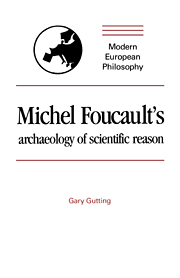Book contents
Summary
There is no simple or direct connection between The birth of the clinic (BC) and FD. We might be tempted to read BC as a history of the concept of bodily illness, paralleling FD's history of mental illness. But this would ignore the far more restricted range of analysis in BC, which says nothing about Renaissance medicine and offers only a relatively brief treatment of the Classical view of disease as a contrast to what emerged in the nineteenth century. Nor is BC a mere appendix to FD. Its historical locus is, as we have seen, denned by the crucial point in the history of madness at which the general system of confinement broke down and separate arrangements had to be made for the mad, criminals, and the sick. But, despite this connection, BC approaches its topic without reliance on the results of FD, which is never even cited. This no doubt reflects Foucault's Bachelardian tendency to eschew facile syntheses and treat each “region of rationality” in its own terms.
BC is generally regarded as Foucault's furthest move in the direction of structural analysis. The first printing of the book frequently referred to its approach as “structural,” although Foucault deleted such references in later printings to avoid what he came to regard as a highly misleading characterization of his work. There is surely something broadly structuralist about certain aspects of BC's analysis, particularly the focus in the latter part of the book on language as a phenomenon, independent of speakers’ intentions, to be analyzed as an autonomous system of rule-governed elements.
- Type
- Chapter
- Information
- Michel Foucault's Archaeology of Scientific ReasonScience and the History of Reason, pp. 111 - 138Publisher: Cambridge University PressPrint publication year: 1989

